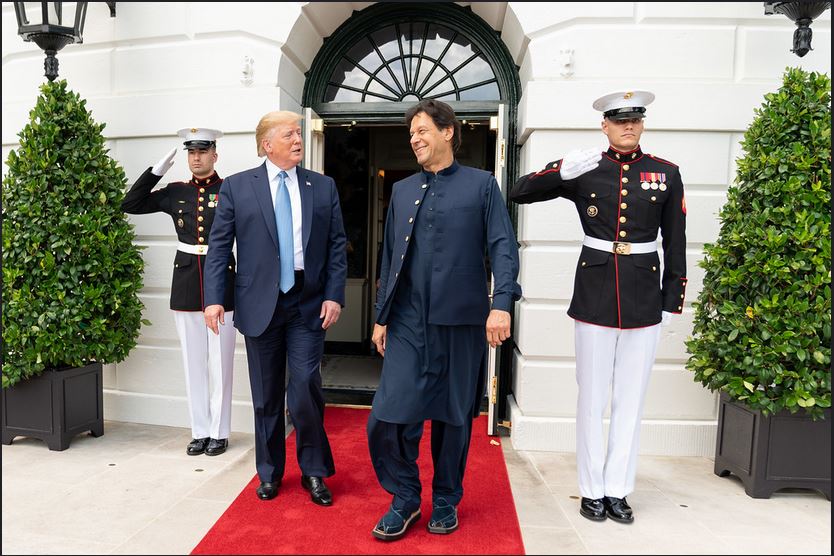The Complex US-Pakistan Relationship Amid Global Political Shifts
The relationship between the United States and Pakistan remains fraught with complexities, oscillating between cooperation and tension. Issues such as conflicting diplomatic priorities, nuclear policies, and regional dynamics, including the legacy of the War in Afghanistan, continue to shape this delicate partnership. For many Pakistanis, the US is often seen as meddling in their domestic affairs—a perception amplified by decades of economic instability, political turmoil, and military interventions, particularly in the aftermath of the US-led “War on Terror.”
Imran Khan’s Political Saga
This narrative of US interference gained traction when former Pakistani Prime Minister Imran Khan accused Washington of conspiring to remove him from office. Khan was ousted in 2022 through a no-confidence vote in parliament, and he was later sentenced to 10 years in prison on corruption charges in January 2024, just weeks before Pakistan’s general elections. Although these allegations remain unsubstantiated, Khan’s claims of collusion between Pakistan’s military generals and the US resonated deeply with his supporters.
Khan’s incarceration has become a focal point for his followers, particularly after Donald Trump’s victory in the 2024 US presidential elections. Khan’s supporters have speculated that Trump might take a public stance on Khan’s imprisonment, citing their cordial interactions during Khan’s tenure as prime minister, including his visit to the White House in July 2019. Trump’s past remarks describing Khan as a “very good friend” during their meeting at the 2020 World Economic Forum in Davos further fuel these hopes.
Pakistani-Americans and Trump’s Second Term
The 625,000-strong Pakistani-American community has shown notable support for Trump, pledging allegiance to his administration over the Democrats, led by Kamala Harris. Many view Trump’s non-interventionist rhetoric and his opposition to regime-change policies as potential indicators of leniency toward Khan’s plight. However, claims circulating on social media suggesting Trump’s active plans to advocate for Khan’s release have been debunked as altered videos spread by Khan’s supporters.
The Reality of US Foreign Policy
Despite the optimism among Khan’s supporters, analysts caution against expecting dramatic changes in US-Pakistan relations under Trump. Historically, US administrations have prioritized strategic alliances with Pakistan’s military establishment over civilian leaders. This approach underscores the military’s dominance in Pakistan’s political landscape, often leaving elected officials like Khan on the periphery of bilateral decision-making.
The Biden administration focused on strengthening ties with Pakistan through initiatives in technology and renewable energy, areas that Trump’s policies may deprioritize. While Trump’s rapport with Khan might signal symbolic support, his administration’s primary focus is expected to remain on countering Chinese influence and maintaining regional stability, especially concerning relations with India.
Risks of Intervention
Any direct intervention by Trump in Khan’s case could deepen political divisions within Pakistan. Supporting Khan may be perceived as aligning against Pakistan’s military establishment, potentially intensifying the civilian-military power struggle. Moreover, Trump’s transactional foreign policy raises concerns about the sustainability of any commitments he might make regarding Pakistan.
Strategic Interests in South Asia
Pakistan’s strategic importance in South Asia positions it as a key player in the US’s broader geopolitical objectives, particularly as a counterbalance to China and Iran. While Washington has traditionally regarded Islamabad as a critical ally in regional security, the focus remains on maintaining stable relations with Pakistan’s military leadership rather than engaging in domestic political disputes.
FAQs
1. Will Donald Trump advocate for Imran Khan’s release?
There is no official indication that Trump plans to intervene in Khan’s case. Speculations arise from their past interactions, but US foreign policy typically prioritizes strategic interests over individual political figures.
2. How does the Pakistani-American community view Trump’s presidency?
Many Pakistani-Americans support Trump due to his non-interventionist stance and perceived opposition to regime-change operations, although this does not guarantee policy shifts favoring Imran Khan.
3. What are the implications of US-Pakistan relations under Trump?
Trump’s administration is likely to focus on countering Chinese influence and maintaining regional security, continuing the US’s historical preference for engaging with Pakistan’s military establishment.
4. How does the US view Pakistan’s role in South Asia?
Pakistan is considered a strategic ally in countering regional threats and balancing power dynamics in South Asia, particularly concerning China and Iran.
For more insights into US-Pakistan relations, visit Council on Foreign Relations and Brookings Institution.





